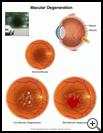
Macular Degeneration and Nutrition
________________________________________________________________________
KEY POINTS
- Macular degeneration is a disease that damages the center of the retina (macula). The retina is the lining at the back of the eye that senses light coming into the eye. The macula allows you to see fine details in the center of your field of vision. Abnormal blood vessels can grow under the retina, leak blood and fluid, and cause scarring. Vision loss from this damage can happen quickly.
- A specific supplement containing beta-carotene or lutein/zeaxanthin, vitamins C, and E, as well as zinc and copper, may help preserve vision in some forms of macular degeneration. Try to get vitamins and minerals by eating a well-balanced diet that includes a lot of fruits and vegetables. Ask your eye care provider if you would benefit from taking supplements.
________________________________________________________________________
What is age-related macular degeneration?
Age-related macular degeneration (AMD) is a disease that damages the macula in the eye. The macula is in the center of the retina. The retina is the lining at the back of the eye that senses light coming into the eye. The macula allows you to see fine details in the center of your field of vision.
There are two forms of AMD:
- The dry form of AMD causes a slow breakdown of light-sensitive cells in the retina. Dry AMD tends to progress slowly, and may not greatly affect vision, unless it affects cells in the center of your vision.
- The wet form happens when abnormal blood vessels grow under the retina. These vessels leak blood and fluid and cause scarring. Vision loss from this damage can happen quickly.
AMD is a common problem for many people as they get older. It usually affects both eyes, but one eye may be affected before the other.
Are vitamins and zinc helpful in treatment of AMD?
A specific vitamin and mineral supplement containing a form of vitamin A called beta-carotene, vitamins C, and E, as well as zinc and copper, may help preserve vision in some forms of AMD. Further studies have shown that lutein and zeaxanthin might be safer and more effective nutrients than beta-carotene.
Vitamins: Vitamins probably play a role in the health of the retina. Vitamins C and E may protect the macula from damaging oxygen molecules called free radicals.
Carotenoids: Beta-carotene, lutein, and zeaxanthin are carotenoids. Carotenoids are nutrients typically found in plants such as leafy green vegetables. These nutrients may protect the retina from damage, such as from ultraviolet light.
Zinc: Zinc is a mineral that comes from meat, eggs, and seafood. Just how much zinc we need for good health and vision is not known. People with low levels of zinc in their blood may have more eye problems than other people. Some older people have lower blood levels of zinc, either because their diets are low in zinc or because they do not absorb zinc from their food.
However, taking zinc supplements may or may not slow down AMD. In fact, too much zinc can interfere with the body's use of copper, another important mineral.
Omega 3 fatty acids have not been shown to help decrease the risk of AMD.
Should I take supplements if I have AMD?
The Age-Related Eye Disease Study (AREDS2) showed that high doses of a specific formula of vitamins and minerals may help reduce the risk of vision loss in some forms of AMD. However, beta-carotene may increase the risk of lung cancer in people who smoke. Talk to your healthcare provider before taking vitamin A if you smoke or have ever had lung cancer. Lutein and zeaxanthin can be used instead of beta-carotene. Ask your eye care provider which supplements you should take.
Try to get vitamins and minerals by eating a well-balanced diet that includes a lot of fruits and vegetables. Do not take large doses of any vitamins or minerals unless your provider approves.

